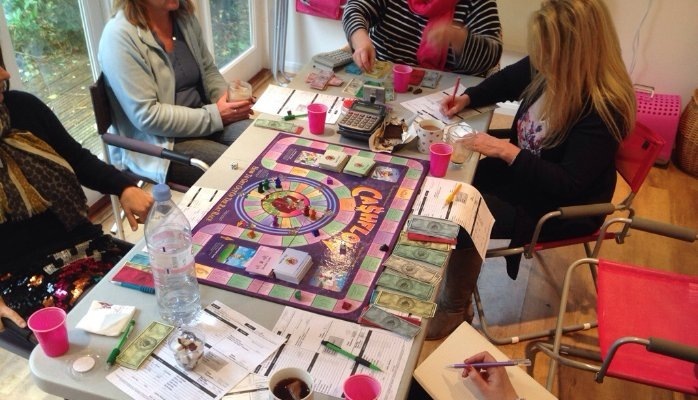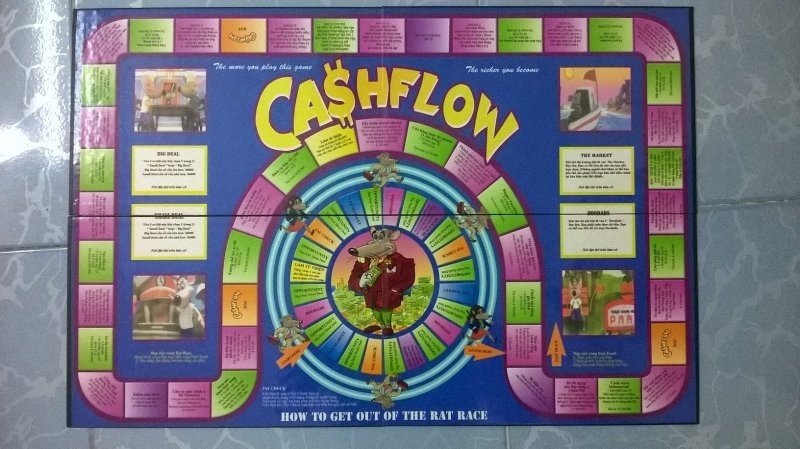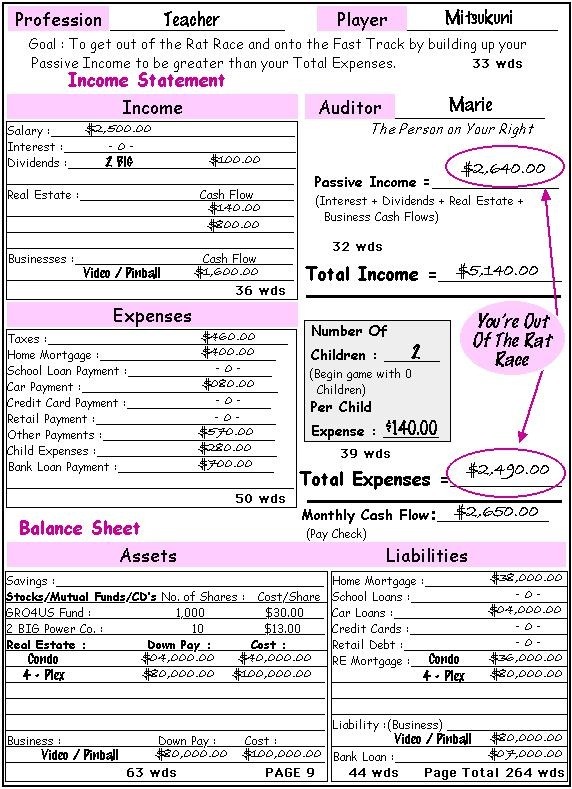Why you need to play the game CA$HFLOW

I was inspired to write this article because I read an article called “Monopoly’s business lessons for life” by Writer and Entrepreneur, Andrew 🐝 Goldman. He spoke of all the skills that he learned playing the great family board game of Monopoly.
Yet, while I was reading this I remember a different game that almost change my entire way of financial thinking. It was Robert Kiyosaki’s “CashFlow”. The most different aspect of this game was I wasn't competing against other players. I was playing to learn.

CASHFLOW is played in two parts, and the rules are slightly different in each.
Everyone starts out in the "Rat Race" or the inner circle of the board. It mimics how most people live their lives financially. The goal of the first part is to get out of the Rat Race.
When you do, you go into the second part of the game, called the "Fast Track". This is the world the wealthy live in.
The Rat Race and the Fast Track have their own tracks on the game board. This intro mainly talks about the Rat Race - you'll learn about the Fast Track when you get there.
Getting Started
You'll receive two playing pieces, a rat and a piece of cheese.
First, you pick a dream. These are the pink spaces on the Fast Track. Find one you like, and put your cheese piece on it. For now, all you need to know is that when you get to the fast track, you will have the opportunity to realize your dream. (Some groups don't do this step. If your group is like this, take time at some point to look over the Dream spaces.)
You'll also get a blank game sheet. The game sheet is where you'll record your financial information. This is where CashFlow differs from Monopoly on an exponential level. This balance sheet is like your financial IQ.
Here is an example:

I had taken accounting in college so I knew what a balance sheet was, I just didn't really understand one yet. This is because I only used it in class.
Next, you pick a Profession card (if someone doesn't pick it for you). The profession card looks like a smaller version of the game sheet, with numbers filled in. You'll copy the info from the Profession Card onto the Game Sheet. After that, you don't need the Profession card. The last thing to set up is your starting cash. This is equal to the sum of your Savings (in the Asset Column) and one month's cash flow. Your Profession Card will have all your starting info like Income, Debt, Assets, and Liabilities.
Playing the Game
Your turn was much different than playing Monopoly. When it was your turn you roll the die.
The Rat Race is the track that you start on. Place your rat token on the "Start Here" arrow on this track.
You will find four main kinds of spaces in the Rat Race.
One is the yellow "Pay Check" space. Whenever you land on or pass this space, add the amount of your Monthly Cash Flow to your total cash.
Another space is the green "Opportunity" space. This means you have found an investment opportunity. When you land on this, draw a card from either the "Small Deal" or the "Big Deal" stack - your choice. ("Small" and "Big" refers to how much money you will need to partake in the deal. Most Small Deals cost a few thousand or less; Big Deals usually take tens of thousands.)
Next is the blue "Market" space. When you land on it, draw a Market card. These cards include buyers of investments you may own, such as real estate, and other economic events that may affect you.
The fourth main kind of space is the pink Doodad space. A doodad is something that you spend money on, and which does not really contribute to your financial growth, like when you buy a XBox. The expense is not optional; when you land on this space, draw a doodad card, read it, and pay up. At the end of your turn you must make the change to your Balance Sheet.
Getting Out
When you get your game sheet, you will notice that your income is broken down into two parts: salary (from your day job), and what is called passive income. Passive income is income that comes in with little or no additional effort on your part. If you have royalties from a book, income from a rental property you own, or stock that pays dividends each quarter, you have passive income.
So, again: in this game, how do you get out of the rat race? Very simply, make investments that give you passive income. (Mostly these will come from Small Deal and Big Deal cards.) When your passive income is greater than your total expenses, you are OUT.
What this means in the real world is you have the ability to leave your job if you wish.
I, myself, only played this game three times. The first two times that I played I pulled Profession cards that had very high salaries, yet I was high in debt and had higher expenses. I thought will higher pay I could pay my way out of debt. Yet, each time I paid off something, I drew a card with another bill to pay.
Yet, the third time I played, my profession was that of a janitor, if I remember. I had a lower lifestyle and less debt. I was also more knowledgeable about how to use my income. Instead of waiting my next paycheck, I took risks in the game and began to build my asset column. We played for a few hours, but I finally had a passive income greater than my expenses. We did not have time to keep playing where I could play the fast track, I was so happy to see that I was now free from employment in this game.
Conclusion
The main reason that I feel that CashFlow is the best learning game is it gives you the best feeling of real life. When playing Monopoly, you are dealing with Real Estate and Trading, I don't feel these scenarios come into most peoples lives. The majority of people I know work there career from paycheck to paycheck hoping to pay off their bills, thus stuck in the rat race.
"""
Articles from Preston 🐝 Vander Ven
View blog
Photo Credit to: · www.forbes.com · Everybody is always talking about the millions of reasons not to ...

(image credited to · top10tale.com) · Motivation is the driving force that inspires people to take a ...

I have always love the quote by Henry Ford, "If you think you can or can't, your right." This quote ...
You may be interested in these jobs
-

Director of Mechanical Engineering
Found in: Lensa US 4 C2 - 1 day ago
Osborn Engineering Tampa, United StatesOsborn Engineering is seeking a Director of Mechanical Engineering for our Florida Division.This unique opportunity requires a highly motivated Mechanical Engineer interested in helping lead and direct a well-established Mechanical team for a long-standing engineering firm. The i ...
-

Pruneyard - Kitchen Team Member>
Found in: Lensa US 4 C2 - 1 day ago
sweetgreen Campbell, United StatesSweetgreen S Bascom Ave suite 450 [Food Service / Line Cook / Prep Cook] As a Kitchen Team Member at Sweetgreen, you'll: Learn and maintain knowledge of the menu and ingredients; Prep all cold and hot food items and follow proper knife safety procedures; Operate oven and all othe ...
-
Corporate Engagement and Government Relations Director at DHQ
Found in: Jooble US O C2 - 22 hours ago
The Salvation Army USA Western Territory Honolulu, HI, United StatesDescription · DEPARTMENT: Divisional Development · DIRECT SUPERVISOR: Divisional Director of Development · STATUS: Full-Time, Exempt · DATE: January 2024 · MISSION STATEMENT: · The Salvation Army, an international movement, is an evangelical part of the universal Christian C ...
Comments